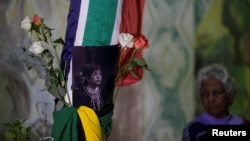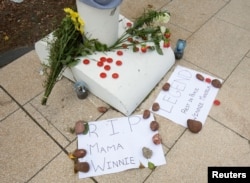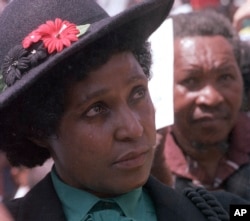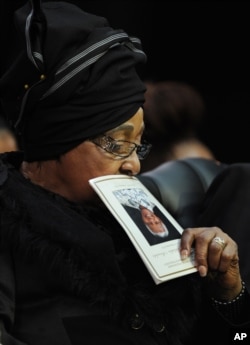In South Africa, tributes to the late anti-apartheid activist Winnie Madikizela-Mandela continue to pour in. She died Monday in Johannesburg following a long illness. Her passing will be marked by a state funeral and memorial service later this month.
Lioness, heroine and mother of the nation — these are the words being used to describe the late Winnie Madikizela-Mandela. She died at the age of 81.
South African President Cyril Ramaphosa, who visited the Mandela family on Monday, described her as a voice of defiance and resistance in the face of repression.
“We have declared that Winnie Mandela will have a national official funeral, which will be held on the 14th of April and there will be an official memorial service, on the 11th, but then again there will be many other memorial functions right across,” said Ramaphosa.
Winnie Mandela was a prominent figure in the battle to end white minority rule alongside her late ex-husband, Nelson Mandela. They were married for nearly four decades.
After her husband was jailed in 1962, she held fast through harassment, arrests, restrictions and imprisonment by the apartheid regime.
However, she could be a polarizing figure. After her divorce with Nelson Mandela in 1996, the Truth and Reconciliation Commission, which investigated crimes committed during the apartheid period, concluded that she had been involved in assault, murder and abduction.
She was also later convicted of fraud and slapped with a suspended sentence.
To mourners who have streamed to her home since her passing on Monday, she remains a revered activist for freedom.
Johannesburg resident Susan Matlodi said she will forever missed.
“She was a true heroine that lady because she stood up against apartheid. She stood by her husband Tata Mandela when he was at Robben Island, raising up kids alone, and she fought for us as ladies, so I’m really saddened about her passing on,” she said.
The ruling ANC at the party level has also expressed its grief. The party said Winnie Mandela’s resilience and courage inspired freedom struggles not just in South Africa but across the continent. The South African Communist Party chose to describe her as an activist for gender equality and a democratic revolutionary.
And the Nelson Mandela Foundation said all South Africans are indebted to her, whether they acknowledge it or not.
The South African religious community is also paying tribute. Njongonkulu Ndungane, is a former Archbishop of the Anglican Church in South Africa.
“She touched our hearts, and I think that she championed the cause of the poorest of the poor and being the voice of the voiceless. She became commonly known as the mother of the nation. She was just at the heart of giving us youngsters the hope for the future,” he said.
The African Union Commission in its tribute statement said Winnie Mandela will be remembered as a fearless campaigner who sacrificed much of her life for freedom in South Africa.







